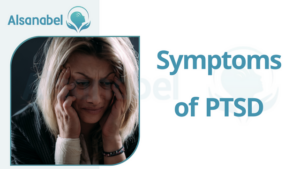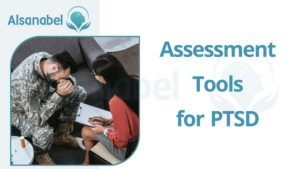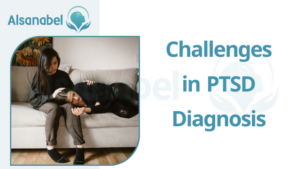The Crucial Elements of PTSD Diagnosis 2024
- Category Psychiatric in Qatar
Post-Traumatic Stress Disorder (PTSD) is a serious mental health condition that can develop after experiencing or witnessing a traumatic event. It can affect individuals of all ages and backgrounds and can have a significant impact on their daily lives.
It is important to note that not everyone who goes through a traumatic event will develop PTSD. The risk factors for developing Post-Traumatic Stress Disorder include the severity of the trauma, the individual’s proximity to the event, and the presence of prior traumatic experiences. Military personnel, survivors of accidents or natural disasters, and individuals who have been victims of violence or abuse are at higher risk for developing Post-Traumatic Stress Disorder.
Table of Contents
ToggleCommon causes of PTSD
Post-Traumatic Stress Disorder can be caused by a variety of traumatic events. Some common causes include:
- Combat and warfare: Military personnel who have been exposed to combat situations or have witnessed violence and death can develop it.
- Natural disasters: Survivors of earthquakes, hurricanes, floods, or other catastrophic events may experience trauma that leads to the development of it.
- Physical or sexual assault: Individuals who have experienced physical or sexual assault, whether in childhood or adulthood, are at higher risk for developing it.
- Accidents or injuries: People who have been involved in severe accidents or have suffered serious injuries may develop it as a result of the traumatic experience.
- Childhood trauma: Traumatic experiences during childhood, such as neglect, abuse, or witnessing domestic violence, can increase the risk of developing it later in life.
Symptoms of PTSD

Re-experiencing symptoms
Individuals with PTSD often experience re-experiencing symptoms, which involve reliving the traumatic event in various ways. This can manifest as intrusive thoughts, where the person constantly replays the event in their mind.
They may also experience distressing flashbacks, feeling as if they are reliving the event, and may have nightmares related to the traumatic experience. These re-experiencing symptoms can be triggered by reminders or triggers that are associated with the traumatic event.
Avoidance symptoms
Another cluster of symptoms in PTSD are avoidance symptoms. These symptoms involve avoiding situations, places, people, or activities that remind the individual of the traumatic event. The person may go to great lengths to avoid any reminders of the trauma, as it may bring back distressing memories or evoke intense emotional reactions.
Avoidance symptoms can also extend to emotional avoidance, where the individual tries to suppress thoughts, feelings, or conversations related to the traumatic event.
In addition to re-experiencing and avoidance symptoms, individuals with PTSD may also exhibit other symptoms such as negative alterations in their mood and cognition. This can include persistent negative beliefs or thoughts about oneself, others, or the world, as well as a distorted sense of blame or guilt. They may also experience decreased interest in activities they once enjoyed, feel detached from others, and experience difficulties in experiencing positive emotions.
Furthermore, individuals with Post-Traumatic Stress Disorder often experience symptoms of increased arousal and reactivity, such as irritability, anger outbursts, difficulty concentrating, hypervigilance, and sleep disturbances. They may have an exaggerated startle response and may be constantly on edge, anticipating danger.
Diagnostic Criteria for PTSD
Criteria for experiencing a traumatic event
To meet the diagnostic criteria for post-traumatic stress disorder, an individual must have experienced or witnessed a traumatic event. This can include direct exposure to actual or threatened death, serious injury, or sexual violence. It can also include learning about the traumatic event occurring to a close family member or friend, or experiencing repeated or extreme exposure to aversive details of traumatic events, such as through work.
Criteria for symptoms duration and impairment
In addition to the experience of a traumatic event, a diagnosis of PTSD requires the presence of specific symptoms. These symptoms must last for more than a month and significantly impair the individual’s ability to function in various areas of their life.
The symptoms can be categorized into four clusters: re-experiencing symptoms, avoidance symptoms, negative alterations in mood and cognition, and increased arousal and reactivity.
Re-experiencing symptoms involve reliving the traumatic event in various ways. This can include intrusive thoughts, distressing flashbacks, and nightmares related to the trauma. These symptoms can be triggered by reminders or triggers associated with the traumatic event.
Avoidance symptoms involve actively avoiding situations, places, people, or activities that remind the individual of the traumatic event. Emotional avoidance can also occur, where the individual tries to suppress thoughts, feelings, or conversations related to the trauma.
Negative alterations in mood and cognition can manifest as persistent negative beliefs or thoughts about oneself, others, or the world. There may also be a distorted sense of blame or guilt, decreased interest in activities, detachment from others, and difficulties experiencing positive emotions. Increased arousal and reactivity symptoms include irritability, anger outbursts, difficulty concentrating, hypervigilance, and sleep disturbances. The individual may constantly be on edge, anticipating danger, and have an exaggerated startle response.
Assessment Tools for PTSD
Assessing and diagnosing post-traumatic stress disorder requires the use of reliable assessment tools. These tools help clinicians gather information and measure the severity of PTSD symptoms experienced by an individual. Two commonly used assessment tools for PTSD are the Clinician-Administered PTSD Scale (CAPS) and the Posttraumatic Stress Disorder Checklist (PCL).

Clinician-Administered PTSD Scale (CAPS)
The Clinician-Administered Post-Traumatic Stress Disorder Scale (CAPS) is a structured interview designed to assess the presence and severity of PTSD symptoms. This assessment tool is administered by trained Psychiatrists in Qatar and involves a comprehensive evaluation of the individual’s traumatic experiences and associated symptoms.
During the CAPS interview, clinicians use a series of questions to assess the four clusters of PTSD symptoms: re-experiencing, avoidance, negative alterations in mood and cognition, and increased arousal and reactivity. The interview also evaluates the duration and impact of these symptoms on the individual’s daily functioning.
The CAPS allows Psychiatrist Qatar to assign severity ratings to each symptom and to determine whether the individual meets the diagnostic criteria for Post-Traumatic Stress Disorder according to the Diagnostic and Statistical Manual of Mental Disorders (DSM-5).
Posttraumatic Stress Disorder Checklist (PCL)
The Posttraumatic Stress Disorder Checklist (PCL) is a self-report measure that assesses the presence and severity of PTSD symptoms. This assessment tool is often used in research studies and clinical settings to screen for Post-Traumatic Stress Disorder and monitor treatment progress.
The PCL consists of a list of questions that individuals rate based on their experiences over the past month. The questions cover the four symptom clusters of PTSD, and individuals rate the frequency and severity of each symptom on a scale from 1 to 5.
By analyzing the responses, clinicians can identify the presence of PTSD symptoms, assess their severity, and monitor changes in symptoms over time. The PCL can provide valuable information for treatment planning and evaluating the effectiveness of interventions.
In conclusion, assessment tools such as the Clinician-Administered PTSD Scale (CAPS) and the Posttraumatic Stress Disorder Checklist (PCL) are crucial elements in the diagnosis and evaluation of PTSD. These tools help Psychiatrist in Qatar gather accurate information about an individual’s symptoms and their impact on daily functioning, enabling them to provide appropriate treatment and support.
Co-occurring Disorders with PTSD
Depression
Depression is a common co-occurring disorder with post-traumatic stress disorder. Many individuals who experience PTSD also experience symptoms of depression.
The symptoms of depression can include persistent feelings of sadness, loss of interest in activities, changes in appetite and sleep patterns, difficulty concentrating, and even thoughts of suicide.
It is important to note that Post-Traumatic Stress Disorder and depression can often have overlapping symptoms, making it crucial for psychiatrist in Qatar to conduct a thorough assessment to differentiate between the two disorders.
Anxiety Disorders
Anxiety disorders, including generalized anxiety disorder, panic disorder, and social anxiety disorder, frequently co-occur with PTSD. These disorders can intensify the feelings of fear, worry, and unease experienced by individuals with Post-Traumatic Stress Disorder.
The symptoms of anxiety disorders can include excessive worrying, restlessness, irritability, muscle tension, and sleep disturbances. The presence of anxiety disorders alongside PTSD can complicate the diagnosis and treatment process, emphasizing the importance of accurate assessment and comprehensive treatment planning.
Individuals with PTSD and co-occurring anxiety disorders may require a combination of pharmacological interventions, such as anti-anxiety medications or selective serotonin reuptake inhibitors (SSRIs), and Psychiatric in Qatar approaches, such as cognitive-behavioral therapy (CBT) or exposure therapy, to effectively manage their symptoms.
It is crucial for clinicians to be aware of the potential co-occurrence of depression and anxiety disorders with PTSD to provide appropriate and comprehensive care for their patients. By addressing all of the co-occurring disorders simultaneously, clinicians can help individuals achieve better outcomes and improve their overall well-being.
Differential Diagnosis for PTSD
Distinguishing PTSD from other mental health conditions
Diagnosing post-traumatic stress disorder can be challenging due to the overlapping symptoms with other mental health conditions. However, there are certain criteria and considerations that can help clinicians differentiate PTSD from other disorders.
One key aspect is the presence of a traumatic event. PTSD is typically triggered by a traumatic experience, such as physical or sexual assault, natural disasters, or witnessing violence. Other mental health conditions may not have a clear traumatic event as a prerequisite for the diagnosis.
Additionally, the symptoms associated with PTSD are unique in their intensity and duration. Flashbacks, nightmares, and intrusive thoughts or memories of the traumatic event are hallmark features of Post-Traumatic Stress Disorder. While other disorders may also have similar symptoms, the persistence and severity of these symptoms over an extended period are indicative of PTSD.
Considerations for comorbidities
It is important for Psychiatrist in Qatar to consider the possibility of comorbidities when diagnosing PTSD. Comorbidities refer to the presence of two or more disorders in the same individual. Depression and anxiety disorders are common comorbidities with Post-Traumatic Stress Disorder.
Depression can manifest as persistent feelings of sadness, loss of interest, and changes in appetite and sleep patterns. Anxiety disorders, on the other hand, can intensify the feelings of fear, worry, and unease experienced by individuals with PTSD. Identifying and addressing these comorbidities is crucial for accurate diagnosis and effective treatment planning.
Sometimes, the symptoms of Post-Traumatic Stress Disorder may also mimic other mental health conditions, such as bipolar disorder or substance use disorders. Psychiatrist Qatar need to conduct a thorough assessment, consider the individual’s history and presenting symptoms, and rule out other potential diagnoses before making a definitive diagnosis of PTSD.
In conclusion, accurate diagnosis of PTSD requires careful consideration of the distinguishing features of the disorder and the potential presence of comorbidities. By conducting a comprehensive assessment and ruling out other mental health conditions, clinicians can ensure that individuals receive the appropriate diagnosis and tailored treatment for their specific needs.
Challenges in PTSD Diagnosis

Underreporting and Stigma
One of the major challenges in PTSD diagnosis is underreporting and the stigma associated with mental health conditions. Many individuals who experience traumatic events may not seek help or disclose their symptoms due to various reasons, such as fear of judgment, shame, or perceived weakness.
This can make it difficult for Psychiatrists in Qatar to identify and diagnose Post-Traumatic Stress Disorder accurately. To address this challenge, it is crucial to create a safe and nonjudgmental environment where individuals feel comfortable sharing their experiences and seeking help for their symptoms.
Diverse Symptom Presentations
PTSD symptoms can manifest in a variety of ways, making it challenging to diagnose. While some individuals may exhibit the classic symptoms of flashbacks, nightmares, and avoidance behaviors, others may present with less recognizable symptoms like irritability, difficulty concentrating, or physical complaints.
These diverse symptom presentations can lead to misdiagnosis or delayed diagnosis if clinicians are not aware of the full range of PTSD symptoms. Therefore, it is essential for clinicians to be knowledgeable about the different ways PTSD can present itself and to conduct thorough assessments to accurately identify the disorder.
Additionally, cultural and gender differences can influence how individuals express and experience Post-Traumatic Stress Disorder symptoms. Different cultural backgrounds may have unique ways of coping with trauma, which can impact symptom presentations.
Moreover, societal expectations and gender stereotypes can affect the reporting and perception of symptoms. Psychiatrist in Qatar should be sensitive to these factors and take them into account during the diagnostic process to ensure accurate and culturally sensitive assessments.
In conclusion, diagnosing Post-Traumatic Stress Disorder is a complex task due to the challenges of underreporting, stigma, and the diverse symptom presentations. By creating supportive environments, increasing awareness about PTSD, and conducting comprehensive assessments that consider cultural and gender differences, clinicians can overcome these challenges and provide individuals with the accurate diagnosis and appropriate treatment they need.









